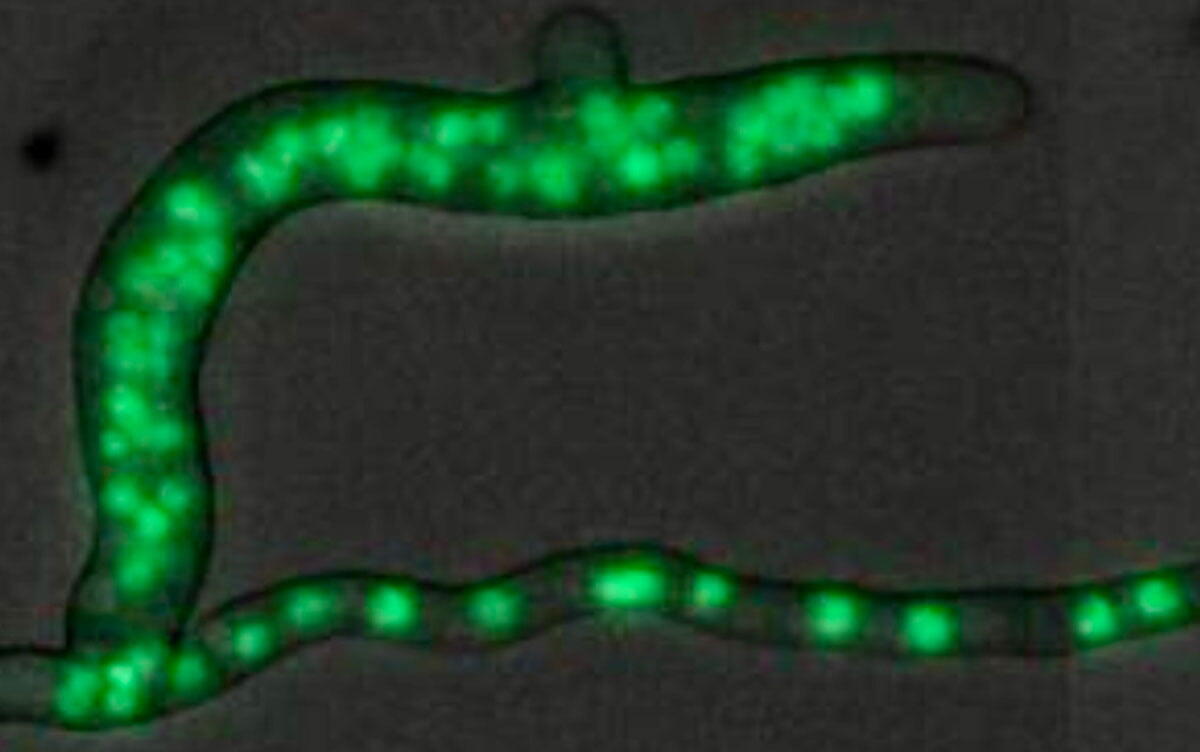Research News
Increase in Cell Volume and Nuclear Number of the Koji Fungus Enhances Enzyme Production Capacity

Researchers at University of Tsukuba have identified key characteristics underlying the high enzyme production capacity of the koji fungus Aspergillus oryzae. During cultivation, the fungal hyphae thicken progressively, leading to a tenfold increase in cell volume and nuclear number. This expansion boosts transcription and translation activity per hypha, thereby enhancing the fungus's overall enzyme production capacity.
Tsukuba, Japan—The koji fungus Aspergillus oryzae has long been used in traditional Japanese brewing and fermentation for sake, soy sauce, and miso. Today, it is also widely used in the bioindustry as a host for enzyme production. This study revealed cellular traits of A. oryzae linked to enzyme production through cell biological analysis. The authors found that, over time in culture, hyphae thicken, resulting in a tenfold increase in cell volume. Simultaneously, the number of nuclei per hyphal cell also rises tenfold, exceeding 200. This increase in cell volume and nuclear number is unique among the Aspergillus species studied and correlates with the fungus's high enzyme production capacity. As nuclear number and cell volume are interrelated, both must increase concurrently. The researchers also identified genetic factors involved in each of these changes. Such traits require high energy and are unlikely to be selected in natural environments. However, A. oryzae, bred over centuries in nutrient-rich environments, may have acquired this trait through artificial selection. Similarly, increased cell volume and nuclear number were also observed in industrial strains of Trichoderma and Penicillium used for enzyme production.
These findings offer fundamental insights into how cell volume and nuclear number are regulated in multinucleate organisms and provide new directions for breeding filamentous fungi for industrial use.
###
This work was funded by MEXT KAKENHI grant number 21H02095, 21K19062 and Scientific Research on Innovative Areas "Post-Koch Ecology" grant number 22H04878 to NT. Ohsumi Frontier Science Foundation, Noda Institute for Scientific Research Grant, and Japan Science and Technology Agency (JST) ERATO grant number JPMJER1502 to NT.
Original Paper
- Title of original paper:
- The increase in cell volume and nuclear number of the koji-fungus Aspergillus oryzae contributes to its high enzyme productivity
- Journal:
- eLife
- DOI:
- 10.7554/eLife.107043.4
Correspondence
Associate Professor TAKESHITA Norio
Institute of Life and Environmental Sciences, University of Tsukuba
Professor MURAYAMA Jun-ichi
Laboratory of Microbiology, Department of Biotechnology, Graduate School of Agricultural and Life Sciences, The University of Tokyo
Collaborative Research Institute for Innovative Microbiology, The University of Tokyo
Related Link
Institute of Life and Environmental Sciences






